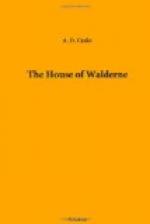What did it mean?
Martin saw it at once—the plague! That terrible oriental disease, probably a malignant form of typhus, bred of foul drainage, and cultivated as if in some satanic hot bed, until it had reached the perfection of its deadly growth, by its transmission from bodily frame to frame. It was terribly infectious, but what then? It had to be faced, and if one died of it, one died doing God’s work—thought Martin.
So as Hubert faced his Welshmen, did Martin face his foe—“typhus” or plague, call it which we please.
Which required the greater courage, my younger readers? But there was no more faltering in Martin’s step than in Hubert’s, as he went to that pallet in an inner room, where a human being tossed in all the heat of fever, and the incessant cry, “I thirst,” pierced the heart.
“So did he thirst on the Cross,” thought Martin, “and He thirsts again in the suffering members of His mystical body—for in all their affliction He is afflicted.”
There was no water close by in the chamber, but Martin had noticed a clear spring outside, and taking a cup he went to the fount and filled it. He administered it sparingly to the parched lips, fearing its effect in larger quantities, but oh! the eagerness with which the sufferer received it—those blanched lips, that dry parched palate.
“Canst thou hear me, art thou conscious?”
“An angel of God?”
“No, a sinner like thyself.”
“Go, thou wilt catch the plague.”
“I am in God’s hands. He has sent me to thee. Tell me sister—hast thou thrown thyself upon His mercy, and united thy sufferings with those of the Slain, the Crucified, who thirsted for thee?”
And Martin spoke of the life of love, and the death of shame, as an angel might have done, his features lighted up with love and faith. And the living word was blessed by the Giver of Life.
Then he felt the poor child pulling him gently to another room, whence faint moans were now heard. There lay the brother, a fine lad of some fourteen summers, in the death agony, the face black already; and on another pallet the dead body of the forester, the father of the family.
Martin could not leave them. The night came on. He kindled a fire, both for warmth and to purify the air. He found some cakes and very soon roasted a morsel for the poor girl, the only one yet untouched, partaking of it sparingly himself. He went from sufferer to sufferer; moistening the lips, assuaging the agony of the body, and striving to save the soul.
The poor boy passed into unconsciousness and died while Martin prayed by his side. The widow lingered till the morning light, when she, too, passed away into peace, her last hours soothed by the message of the Gospel.
Then Martin took the child and led her towards the city, meditating sadly on the strange mystery of death and pain. The woods were as beautiful as before, but not in the eyes of one whose mind was full of the remembrance of the ravages of the fell destroyer.




